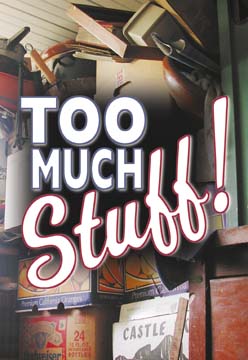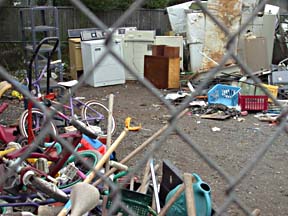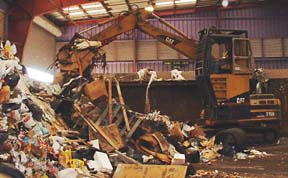|
 
IN
THE NEWS | ART
BEAT | PUBLISHER | CALENDAR

Searching for space --
and peace -- amid the clutter
by EMILY
GURNON
ONE RECENT SATURDAY, I TOOK
MY DAUGHTER TO a couple of garage sales to look for a used stroller.
We left a note for my husband and son: "Went to buy stuff.
Lots of stuff. Clear a space."
It was something of a running
joke between us, since more "stuff" is the last thing
we need, and clearing space anywhere seems about as realistic
as biking to Mars.
The problem has been a nearly
constant preoccupation of mine ever since our family bought a
house this spring with less space than the one we'd been renting.
In my own defense -- and that
of my husband -- we are probably no worse than most Americans
in our struggle with material possessions. We don't consider
ourselves materialistic, and we live within our means. But we
love to read, so we have lots of books and magazines. We research
topics we are interested in, so we have files of papers, notes
and articles. We were middle-aged when we married, so we combined
two sets of furniture and dishes. And we have young kids -- which,
as anyone with kids knows, increases your "stuff" quotient
exponentially.
Of course, I recognize that
we live in the most affluent, consumer-driven society in the
world. Having too much is a problem unique to the privileged.
There are people for whom my possessions would be a godsend.
And there are more important things to be obsessed about: our
gluttonous consumption of non-renewable energy sources, to name
one.
More
is less
Having counted my blessings,
however, I can't escape the reality that, at age 43, my modest
abundance has become oppressive.
![[Emily sitting in her cluttered room]](cover1009-emily.jpg) According
to the National Association of Home Builders, the average size
of a new single-family American home in 2002 was 2,320 square
feet -- up from 900 square feet in 1949. In the same period,
our average family size has shrunk from 4.2 people to 2.6. We've
become used to having more and more space. According
to the National Association of Home Builders, the average size
of a new single-family American home in 2002 was 2,320 square
feet -- up from 900 square feet in 1949. In the same period,
our average family size has shrunk from 4.2 people to 2.6. We've
become used to having more and more space.
Maybe we Americans have sought
more space because we have so much more stuff. The volume and
variety of consumer goods available in our country today is staggering,
and Americans have responded with their pocketbooks. Meanwhile,
the savings rate in the United States dropped from 5 percent
in the early `90s to less than 0 percent by the end of that decade,
writes Vicki Robin in the revised version of her book, Your
Money or Your Life.
While we stoke the fire of consumerism,
leaders such as President George Bush and San Francisco Mayor
Willie Brown call for more -- in the name of patriotism. (The
city of San Francisco ran a billboard campaign after the Sept.
11 attacks that encouraged spending with one simple image: an
American flag with shopping bag handles on it.)
And what do we do when we buy
more stuff than we have space to put it? We simply buy more space.
The self-storage industry has exploded; the number of facilities
has risen from about 8,000 in the mid-1980s to 35,000 in 2002,
according to The Self Storage Almanac, published by MiniCo.
Publishing of Phoenix. Nationwide, 75 percent of self-storage
customers are residential.
We had our own storage space
in the Bay Area, when we lived in a one-bedroom apartment there.
I cringe to think of all those $120-a-month payments and the
better uses for which they could have been spent.
Fortunately, we have all of
our possessions in one place now. Our house in Eureka, built
in 1942, measures a little more than 1,000 square feet, with
three small bedrooms, one bathroom and a one-car detached garage.
The old rental house had a bigger garage, an extra closet and
one additional bathroom. But the home I grew up in was not much
larger than this one, and there were seven of us living there
for a time. I shared a bedroom with my two sisters. I never remember
thinking that it was cramped.
![[boxes of stuff]](cover1009-stuff.jpg) I
still believe I have enough space. It's my stuff that's the problem:
I have more things than room to fit them in. I
still believe I have enough space. It's my stuff that's the problem:
I have more things than room to fit them in.
This creates secondary problems:
I can't find my black T-shirt because my closet is crammed full
of clothes. My books sit on stacks on the floor of the study,
or in boxes in the garage, because there is not enough bookshelf
space. (To be precise, there are bookshelves -- in the garage
-- but there isn't enough wall space for them in the house.)
Last week, I bought a new pair of pliers because I couldn't find
the ones I know we have... somewhere.
And then there's the clutter.
I wear the same two pairs of earrings over and over because the
top of my dresser is a morass of assorted junk, leaving no room
to take out the boxes of jewelry I packed away for the move.
Every surface of the house, it seems, is covered with things:
newspapers, mail, coins, photos, magazines, rubber bands, pens,
receipts, unfinished notes, phone messages, toys, pieces of broken
toys. Children's artwork that arrives home every day they're
at school (and how can I resent this?).
The problem, says professional
organizer Claire Josefine of Eureka, is not that I have too much,
but that I don't have things "systematized."
"From what I see,"
she said on a recent visit to my house, "you don't know
where to put things." I need to get creative with my space,
she insists. Think vertical; get taller bookshelves, put pockets
up on the walls, build shelves above the bathroom towel bars.
Clutter
blues
She's right about not having
a designated place for everything. If I have to take time to
think, now where should I put this?, it just sits there.
And it gets me down.
Mary Nesset, a marriage and
family counselor in Eureka, said that clutter can not only be
a symptom of depression, but can contribute to it. "If you
feel chaotic inside and everything on the outside is in chaos,
too, then there's the sense that you're really out of control,"
she said. At that point, "the clutter looks monumental,
so it's kind of a vicious circle."
In preparation for our move
to the new house, we packed up things we didn't need right away.
The pile of boxes labeled "kitchen" grew to 15, including
some that we hadn't opened since the previous move, three years
ago. We brought them to the new garage, where they sat unopened
for three months. We didn't give them a second thought.
When we did start to open them,
there were some happy reunions with things we hadn't seen for
those years -- the brilliantly colored glass plates my artist
friend Susan made, the funky champagne flutes my dad bought for
our wedding.
But there was also that sinking
feeling: the point where you're sitting on your kitchen floor,
surrounded by crumpled up newspaper, and looking up at the crammed
cupboards. And the boxes are not yet empty.
It's gotten to the point where
I look around my house, constantly thinking, what else can I
throw away or pass on to someone else? A few weeks ago, a small
coffee cup fell on the floor, shattering to pieces. I secretly
rejoiced. One less cup! I thought.
Craving
voids
My college friend Anne was married
for four suffocating years to a man who had filled his house
to the brim with antique furniture, art deco ceramics and his
prized collection of little metal buildings. Hundreds of them.
She moved in, trying to find a physical and spiritual space for
herself. It never did feel like home.
Mutual friends would ask her
what she collected. "Empty spaces," she'd say.
Like Anne, I'm thinking of starting
an empty space collection. Corners with nothing in them, a clear
expanse of this beautiful hardwood floor, clean surfaces. Space
is becoming something I covet, because I equate it with serenity,
peace and a clear head. It comes down to choices. Now, when I
think about buying something, I think, "I can have this
thing. Or I can have the space."
I aspire to be more like my
friend Kathleen, a well-dressed San Francisco reporter who lives
in an amazingly uncluttered one-bedroom apartment.
"Kathleen," I said,
when I called her at work this week, "how many skirts do
you have?"
"Um, four."
"How many blouses?"
"For work? Let's see, six."
"Pants?"
"Two pair."
"Sweaters?"
"I'm kind of low in the
sweater department right now. One."
Now, here I am thinking, if
anyone calls me and asks me what's in my closet right now, there's
no way in a million years I can tell them off the top of my head.
I'll go count: 21 blouses, 22 sweaters, five pairs of good pants,
five turtlenecks, assorted vests, jackets and T-shirts. And that's
not counting whatever has managed to fill up my dresser. This
is after I've donated piles of things to our preschool's rummage
sale.
The last time I (temporarily)
had as little as Kathleen was 10 years ago, when, just out of
journalism school, I accepted a three-month internship at the
Chicago Tribune. I brought as much as I could carry on
the plane, and shipped my computer. I rented a studio apartment
on the 14th floor of an old high-rise, the kind with a metal
accordion gate in the elevator that you have to pull back to
get in and out. My place looked like a very small hotel room:
It had a foldout bed, one counter for the kitchen, a dorm-size
refrigerator, a desk, one chair, a closet and a bathroom. I had
a half-dozen books, a handful of clothes, a pair of shoes and
a pair of winter boots.
And I loved that room. I loved
the simplicity of it and the fact that I spent virtually no time
"straightening up." That I could look around and not
be accosted by piles of junk.
 If it's trash, If it's trash,
bring it to the dump.
Unusable donations
are stored at St. Vincent de Paul's thrift store in Arcata. The
organization spends $2,000 to $3,000 each month to
dispose of things it can't sell -- most of which have been
dumped after hours.

Dreadful
mess
Harriet Schechter, author of
Let Go of Clutter, takes a somewhat different approach
to the whole dreck issue, arguing that "organizing can actually
obstruct the letting go process by giving you a way to put off
getting rid of stuff as you endlessly putter with your clutter,"
and "providing you with a good excuse to buy more stuff
(disguised as `organizing supplies')."
So why do we have such a hard
time freeing ourselves from our stuff?
Part of it, Schechter writes,
is the emotional baggage attached to our possessions. I cringe
to think of some of the boxes out in my garage. At least one
of them contains books that I bought in grad school and never
read. Opening the box is like delving into that guilt all over
again. Then there are the gifts: the things we feel sentimental
about (or worse, that we think we should feel sentimental
about, but don't) -- wouldn't it be an insult to the giver for
us to send these away? It's even worse with those things left
to us from a person who is now dead. But what am I going to do
with my father's beautiful old London Fog coat, probably the
most expensive coat he ever owned? It will never fit my slim
husband.
"Clutter clearing can bring
up a lot of `stuff' to be faced and dealt with, and intuitively
everybody knows it," writes Karen Kingston in her book,
Clear Your Clutter With Feng Shui. But facing your fears
and letting go of things "brings you greater clarity about
your life purpose," she writes.
I'm not sure I buy all of the
feng shui ideas. I nearly tossed aside her book when Kingston
described how she is able to do "energy readings" with
her hands, feeling an "unpleasant, sticky" sensation
when she comes across clutter. OK, though I've lived in California
for 25 years, I'm still a Midwesterner, fundamentally suspicious
of new-agey philosophies. But I can relate to the idea of freeing
up my energy by getting rid of all this visual noise that surrounds
me.
Give
it up
As I was writing this piece,
Journal arts editor Bob Doran tossed a CD on my desk.
It's Eric Bibb's new disc, Natural Light, and the first
cut is titled, coincidentally, "Too Much Stuff."
I've ended up with too much
stuff
no matter what it cost me
I couldn't get enough
gotta put it all behind me
gotta give it all up
I ended up with too much
stuff.
It's a great song, and it reminds
me -- as have conversations with many friends on this topic --
that I'm not the only one dealing with it.
If for no other reason, I should
pare down my possessions for my kids, reminds Josefine, the professional
organizer. Having too much adds to their personal chaos and teaches
them to fall into the same traps. Indeed, one of the very first
pieces of paper our son brought home from kindergarten this year
was a note that advised, "Please help your child learn to
be organized by having a consistent place to put his or her things
at the end of each day."
Oh boy, I thought, the poor
little guy is doomed.
I want to give my kids the tools
to be organized, to know the true meaning of things, to get "stuff"
out of the way of our lives. On a more global level, I also want
them to appreciate what we have and to be good stewards of the
world's resources.
So I think I'll celebrate my
next birthday the same way one 40-year-old New York woman did,
according to a Wall Street Journal story. Having convinced
herself that she had what she needed, and could buy what she
wanted, she invited friends to come to her house and take something
away.
|
BOOKS, ETC.
Your Money or Your Life, by Joe Dominguez
and Vicki Robin, Penguin Books, revised 1999.
The Overload Syndrome, by Richard A. Swenson, Navpress,
1998.
Clear Your Clutter with Feng Shui, by Karen Kingston,
Broadway Books, 1999.
Let Go of Clutter, by Harriet Schechter, McGraw-Hill,
2001.
The Simple Living Guide, by Janet Luhrs, Broadway
Books, 1997.
"Affluenza" and "Escape from Affluenza,"
by John de Graaf, PBS television programs and companion book,
1998.
"The 12 Basic Principles of Being Organized,"
brochure by Claire Josefine, , 2003.
Stop Clutter from Stealing Your Life, by Mike Nelson,
New Page Books, 2000.
The Zen of Organizing, by Regina Leeds, Park Slope
Press, 2000.
The Poverty of Affluence, by Paul Wachtel, The
Free Press, 1983.
Local Feng Shui practitioners: Francine Tuft Peterson,
268-8889; Karen Carrasco, 825-8859; Sydney Munguia, 800-283-3859.
WEB SITES:
The New Road Map Foundation, www.newroadmap.org
Adbusters (anti-consumerist magazine), www.adbusters.org
ClutterLess Recovery Groups, Inc., www.clutterless.org
The Center for a New American Dream, www.newdream.org
Linda M. DePaz, organizing consultant, beclutter-free.com
The Simple Living Network, www.simpleliving.net
Simple Living Journal, www.simpleliving.com
Co-Op America, www.coopamerica.org
Alternatives for Simple Living, www.simpleliving.org
|
IN
THE NEWS | ART BEAT | PUBLISHER | CALENDAR
Comments?

© Copyright 2003, North Coast Journal,
Inc.
|


![[Emily sitting in her cluttered room]](cover1009-emily.jpg) According
to the National Association of Home Builders, the average size
of a new single-family American home in 2002 was 2,320 square
feet -- up from 900 square feet in 1949. In the same period,
our average family size has shrunk from 4.2 people to 2.6. We've
become used to having more and more space.
According
to the National Association of Home Builders, the average size
of a new single-family American home in 2002 was 2,320 square
feet -- up from 900 square feet in 1949. In the same period,
our average family size has shrunk from 4.2 people to 2.6. We've
become used to having more and more space.![[boxes of stuff]](cover1009-stuff.jpg) I
still believe I have enough space. It's my stuff that's the problem:
I have more things than room to fit them in.
I
still believe I have enough space. It's my stuff that's the problem:
I have more things than room to fit them in. If it's trash,
If it's trash, 